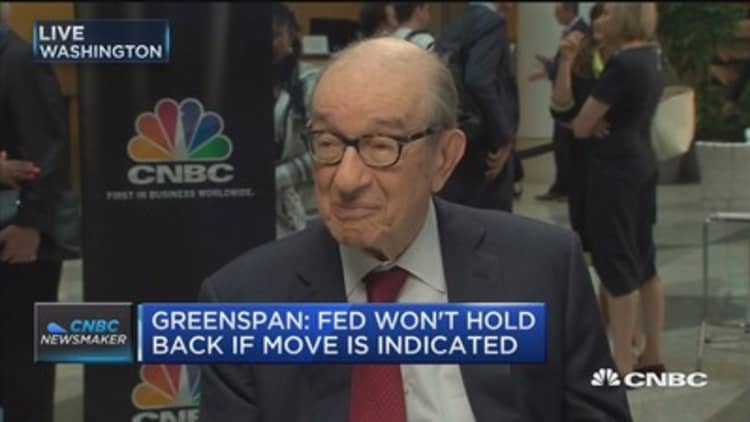
Federal Reserve Chair Janet Yellen has no choice but to endure allegations that her reluctance to raise interest rates has been politically motivated, former Fed chief Alan Greenspan told CNBC on Thursday.
Greenspan said on "Squawk Alley" that she just has to "grin and bear it," referring to Donald Trump's claim that Yellen is the most political person in Washington. "That's the only way you can do it."
The GOP presidential nominee has said the central bank has kept rates steady since December's first hike in more than nine years to protect the economic legacy of President Barack Obama and help Democratic nominee Hillary Clinton to slide into the White House.
"I have great sympathy for [Yellen]," Greenspan said "I've been through that routine for a long time."
The Fed would probably prefer not to raise interest rates in an election year, but if the economic numbers dictate it, policymakers would take action, Greenspan said from the sidelines of the International Monetary Fund-World Bank meeting in Washington.
"The real question essentially is would the Federal Reserve hold back when it should be moving, I would say, no," Greenspan said. He was speaking hypothetically, and did not say whether it was indeed time to raise rates.

Investors will be looking carefully at Friday's release of the U.S. government's September employment report for unexpected signs of strength or weakness that might sway central bankers on whether or not to raise interest rates for the second time in the past decade.
The last rate hike was in December. And a year later, with all the will-they-or-won't-they guessing in between, the futures market puts the odds of another December move at 63.9 percent.
Greenspan said negative rates seen in Europe and Japan are not good. "If you have negative interest rates, and stay too long, a number of the financial intermediaries drop out. And they are on the edge," he said.
He added that the easy money policies of the Fed and other central banks, including maintaining historically low rates, have done as much as they can without the help of fiscal measures, including entitlement reform.
"What we have to do but nobody wants to touch is a rise in entitlements in the United States," he said. "Until we come to grips with that, we're going to get a continuous downward pressure ... in capital investment and then in productivity."
Greenspan, who served 19 years as chairman of the Fed from 1987 to 2006, also said he's still worried about the impact of Britain's summer vote to leave the European Union. He added he's surprised Brexit is not being felt more in the world economy.
But the June vote must be at least partially to blame for the recent retrenchment of the British pound to 31-year lows, Greenspan said.
After the Brexit vote, Greenspan told CNBC at the time the decision would usher in what he called "the worst period" he could recall in all his years of public service, including the 1987 U.S. stock market crash.


